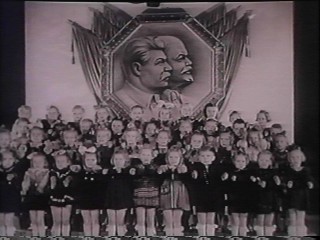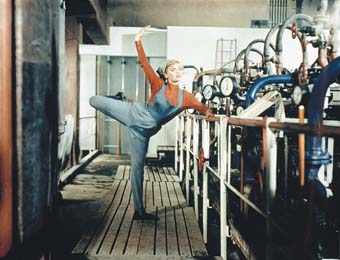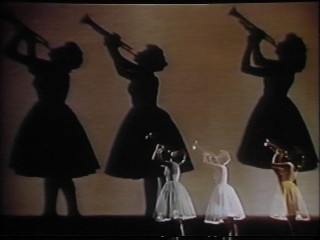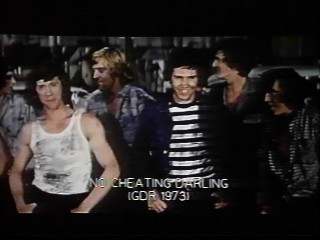|
East Side Story
(1997)
Director: Dana
Ranga
Communist musicals?
When confronted with that idea, I'm sure most people will consider that
a silly though, a sheer impossibility. After all, musicals are usually
associated with images of happiness, fun, and sheer froth. And
communism  has never exactly been a great source of fun,
since it doesn't seem that this ideology seems to encourage it. In
fact, in his 38 volumes of writing, scholars agree that Lenin never
really said anything about entertainment. On the other hand, Lenin did
claim that movies were one of the greatest art forms ever made, since
it was an art that could reach the masses. Still, it's hard to believe
that Lenin would ever applaud the idea of a musical made by a communist
government, even if it was one that promoted the idea of socialism. And
since the governments of Eastern Europe and Russia were trying to form
workers' paradises, how can you think something so gauche as a musical
could get made? has never exactly been a great source of fun,
since it doesn't seem that this ideology seems to encourage it. In
fact, in his 38 volumes of writing, scholars agree that Lenin never
really said anything about entertainment. On the other hand, Lenin did
claim that movies were one of the greatest art forms ever made, since
it was an art that could reach the masses. Still, it's hard to believe
that Lenin would ever applaud the idea of a musical made by a communist
government, even if it was one that promoted the idea of socialism. And
since the governments of Eastern Europe and Russia were trying to form
workers' paradises, how can you think something so gauche as a musical
could get made?
But musicals did get made - about 40 in all behind the Iron Curtain
before the collapse of communism. Once you get over that surprise like
myself, you then start to wonder just what a communist musical would be
like. I'm sure you have some ideas already. One possibility I bet that
right now is going through your mind is probably something like
this.....Black and white photography of ordinary people in a small
dingy room, and while a crazed-looking guy right out of Reefer Madness
is playing the piano, the choir of citizens sings out:
In the hot blast of the coal oven,
The water turns to steam!
Soon a new sound will ring out!
The coal press begins to stamp!
Raka-daka, raka-daka,
Raka-daka, raka-daka,
We sing the song of the coal press!
Or maybe you picture a color sequence (faded color, of course) about a
wheat harvest (a plentiful harvest, of course.) Everybody in the fields
is working hard (and very happy, of course.) They are so happy, they
are almost dancing - the key word being almost. After all, a true
patriot would never do something so frivolous as dancing, especially
when it's time to work! So to the beat of the music, everyone works,
instead of dances. Strange, however, that apparently everyone is
allowed to sing (though not dance) while working! Maybe it's because of
what they are singing:
We're working on the Steppes,
Before the sun comes up,
So we have bread to nourish
Our athletes and heroes!
Our girls who should be
Pretty and skillful!
Our boys who should be
Fiery in their love!
Well, if you thought of one or both of these scenarios, you'd be right.
The documentary East Side Story shows that there were
indeed times when an Iron Curtain musical was filled with blatant
propaganda. But if you were to picture all of these
 musicals
with this viewpoint, you'd be missing much of the truth. In the 87
minutes of this documentary, we get an introduction to the genre.
Though it can't possibly tell us all of the essentials in such a short
running time - there are some clips and historical notes that are a
little frustrating in their short length - we still get to learn that
there was much more to the Iron Curtain musical genre than with our
initial thoughts. It was a genre full of creativity, passion, and
surprise. By the end of the documentary, viewers will not only be
better educated, but they'll be wanting to see more of some of the
movies showcased in clips here. I know I do. musicals
with this viewpoint, you'd be missing much of the truth. In the 87
minutes of this documentary, we get an introduction to the genre.
Though it can't possibly tell us all of the essentials in such a short
running time - there are some clips and historical notes that are a
little frustrating in their short length - we still get to learn that
there was much more to the Iron Curtain musical genre than with our
initial thoughts. It was a genre full of creativity, passion, and
surprise. By the end of the documentary, viewers will not only be
better educated, but they'll be wanting to see more of some of the
movies showcased in clips here. I know I do.
The first Iron Curtain musicals started to come out in the 1930s, when
Joseph Stalin firmly had a hold on the Soviet Union. Since we all know
that Stalin wasn't exactly the nicest guy in or out of Russia then or
any time since, you will probably assume that the musicals that came
out during that time were strict propaganda, with no charm or
imagination. And with low production values to boot. Actually, that's
not quite how it was. True, there were some pretty ridiculous premises
for musicals at that time; we get to see a clip from the 1939 Tractor
Drivers, and it's quite goofy seeing these proud Soviet farmers
singing joyfully about their tractors and their good lives. There is a
little chill, however, when they go out of their way to boastfully sing
how they will be willingly be directed by Stalin to fight any invading
force they enters their country. (So it's clear that the Soviets,
despite the non-aggression treaty with Germany, weren't totally naive
about the situation brewing in the west.) As well, we get to see
another blatant propaganda clip from the 1940 effort, The Bright
Path. In the clip, a young woman has a dream where she is lead
down an actual path by some holy-like figure to paradise - which is a
factory! Yes, work is the key to happiness, work will make you free,
and the young woman is so overjoyed, she picks up a broom and starts
sweeping the factory floor. (Every little bit helps the Motherland!)
Yet also during the Stalin era, there were musicals that were
essentially pure entertainment, musicals that went against what the
bureaucrats were aiming for? How did they get made? Well, when the
Hollywood-influenced Grigori Alexandrov made 1934's The Jolly
Fellows (which  greatly
resembles the plotless all-singing all-dancing Hollywood musicals of
the time), it was initially banned by the censor board. But after
Alexandrov made a personal plea to Stalin and showed him the movie,
Alexandrov not only got a medal but an unofficial blessing to keep
making movies like that that would be just as pleasing to Stalin. And
as you know, whatever Papa Stalin wanted, he got. Alexandrov later made
Volga Volga, a musical that became Stalin's
favorite movie of all time. If you can get past the fact the movie's
"Life is so good" attitude juxtaposes against the fact that Stalin's
massacres were at their height during the production of this movie,
what you'll find is another spirited piece of pure entertainment. greatly
resembles the plotless all-singing all-dancing Hollywood musicals of
the time), it was initially banned by the censor board. But after
Alexandrov made a personal plea to Stalin and showed him the movie,
Alexandrov not only got a medal but an unofficial blessing to keep
making movies like that that would be just as pleasing to Stalin. And
as you know, whatever Papa Stalin wanted, he got. Alexandrov later made
Volga Volga, a musical that became Stalin's
favorite movie of all time. If you can get past the fact the movie's
"Life is so good" attitude juxtaposes against the fact that Stalin's
massacres were at their height during the production of this movie,
what you'll find is another spirited piece of pure entertainment.
One of the most ironic things that happened after Stalin died, when the
new Soviet government subsequently became more open, the light and pure
entertainment Iron Curtain musicals essentially died as well, since the
new government wanted to get back to the true roots of socialism. The
rest of the documentary chronicles the slow rebirth and regrowth of the
musical up to its second death in the early '70s, and how the attitudes
of musical filmmakers (mostly in East Germany) became bolder with each
passing year. My Wife Wants To Sing had a great struggle
with the censors until public clamor got it released to great acclaim
and big audiences. Using a flimsy excuse to explain it promoting
socialism (socialism says that women can work), the clips show a very
tasteful, well-crafted and crowd-pleasing musical centered around a
domestic drama, which anyone from any political system could identify
with.
Not that it easily encouraged more musicals; the government quashed
plans for a sequel, and it was as difficult as always to make a
musical. This difficulty, in fact, inspired Midnight Revue,
a musical about the difficulty of making a socialist musical! Though
making a musical was difficult, the movie shows that the filmmakers
certainly weren't totally restricted in what they did, certainly with
there being one song where a group of film artists (who were kidnapped
by a crazy director for the purpose of forcing them to help make a
movie!) lamenting:
It's enough to make you tear your hair out!
It's easier to wait 10 years to get a car!
Or to go ice skating in the Sahara,
That to make an entertaining musical film!
By now, you're probably thinking just what the audiences that these
movies were intended for thought of these films. Did they see these
movies as the pure propaganda that they were frequently? Well yes...
and no. With clips from interviews with film historians, crew members,
and actual audience members, we learn that audiences did ignore the
more propagandistic movies, resulting in some  desperate attempts to boost
attendance figures, including forcing schoolchildren to watch some of
these movies. And yes, audiences did frequently flock to movies from
the west. But at the same time, you still gain a sense of affection.
The surviving crew members seem proud that they managed to make these
movies despite all odds. And though the movies may have had propaganda,
they often had characters that reminded citizens of people they knew,
stories they knew. Even something like a silly Frankie and Annette
clone (Hot Summer) warmed their hearts. Contrived as they
might have been at times, the movies were theirs all the same. desperate attempts to boost
attendance figures, including forcing schoolchildren to watch some of
these movies. And yes, audiences did frequently flock to movies from
the west. But at the same time, you still gain a sense of affection.
The surviving crew members seem proud that they managed to make these
movies despite all odds. And though the movies may have had propaganda,
they often had characters that reminded citizens of people they knew,
stories they knew. Even something like a silly Frankie and Annette
clone (Hot Summer) warmed their hearts. Contrived as they
might have been at times, the movies were theirs all the same.
Revelations like that are some of the high points of East Side
Story, and it's a shame the documentary doesn't try for more
pieces of insight like this. At 87 minutes, the movie is really a crash
course in covering the genre; a lot of movie clips only last a few
seconds, and sometimes you don't get a good feeling of the particular
movie being showcased at that moment. Almost none of the various people
that get interviewed really stand out, since they usually just get to
speak a few sentences at any one time, and you wonder why the movie
felt that some of them were worth interviewing in the first place.
You'll want to know more, but it's very likely you'll get frustrated at
times with the lightning-fast pace. This kind of thing would have been
much better done as a multi-part TV series on PBS or some other
specialty channel, a leisurely hour or so at a time. Though the
documentary may be flawed in its presentation, I can certainly say that
it's still educational and entertaining (watch it in 15 minute chunks,
so you won't get too overwhelmed by the fast pace), and you'll probably
want to check out a few of the movies showcased here afterwards.
Check for availability on Amazon (VHS)
Check for availability on Amazon (DVD)
See also: The Apple,
Disk-O-Tek Holiday, That's Black Entertainment
|

